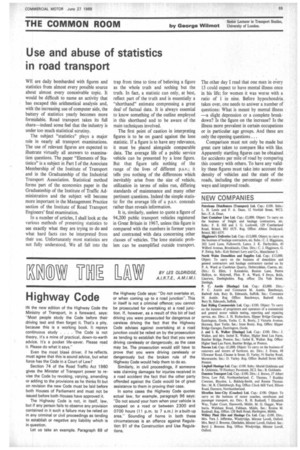ERICY 77N
Page 71

If you've noticed an error in this article please click here to report it so we can fix it.
BY LES OLORIDGE, A.LR.T.E„ AM/MI.
Highway Code
IN the new edition of the Highway Code the Ministry of Transport, in a foreward, says: "Most people study the Code before their driving test and then forget it. That's a pity. because this is a working book. It repays continuous study . . . The Code is not theory, it's a mine of practical, down-to-earth advice. It's a pocket life-saver. Please read it. Please do what it says."
Even the most blasé driver, if he reflects, must agree that this is sound advice, but what force has the Code in a Court of Law?
Section 74 of the Road Traffic Act 1960 gives the Minister of Transport power to revise the Code by revoking, varying, amending or adding to the provisions as he thinks fit but on revision the new Code must be laid before both Houses of Parliament and must not be issued before both Houses have approved it.
The Highway Code is not, in itself, law. but if any person fails to observe any provision contained in it such a failure may be relied on in any criminal or civil proceedings as tending to establish or negative any liability which is in question.
Let us take an example. Paragraph 69 of
the Highway Code says: "Do not overtake at, or when coming up to a road junction". This in itself is not a criminal offence; you cannot be prosecuted for overtaking at a road junction. If, however, as a result of this bit of bad driving you were prosecuted for dangerous or careless driving the fact that the Highway Code advises against overtaking at a road junction could be relied on by the-prosecution as tending to establish the fact that you were driving carelessly or dangerously, as the case may be. The prosecution would still have to prove that you were driving carelessly or dangerously but the broken rule of the Highway Code would help them to do so.
Similarly, in civil proceedings, if someone was claiming damages for injuries received in a road accident the fact that the other party offended against the Code would be of great assistance to them in proving their case.
In some cases the Highway Code quotes actual law, for example, paragraph 96 says: "Do not sound your horn when your vehicle is stopped on a road or between 2300 and 0700 hours (11 p.m. to 7 a.m.) in a built-up area." SOunding of horns in both these circumstances is an offence against Regulation 91 of the Construction and Use Regulations.


















































































































